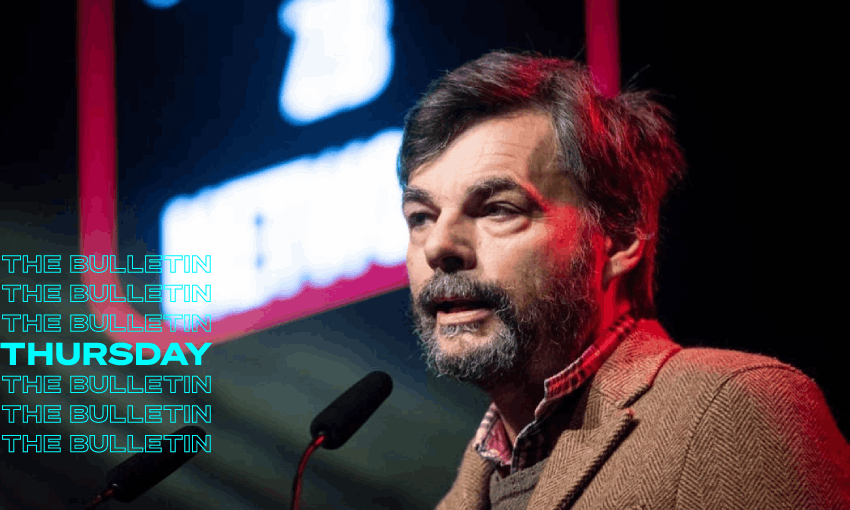Deadline for local government election nominations approaches
Tomorrow at noon, nominations close to stand as a candidate in this year’s local government elections. Concerns remain about a shortage of candidates.
Mōrena and welcome to The Bulletin for Thursday, August 11, by Anna Rawhiti-Connell. Presented in partnership with Z Energy.
In today’s edition: questions raised over government’s flagship mental health programme; draft plan to transform tourism released; children's book award winners but first, the importance of engaging with local democracy.
Marcus Lush announced he would run for mayor in Invercargill last night (Photo: RNZ)
Nominations starting to flow in some areas
Yesterday I included an item about Local Government NZ (LGNZ) issuing an “SOS for local democracy” prompted by concern about a shortage of candidates to stand in the local government elections. As Toby Manhire outlined yesterday, just over 17% of all seats in the 2019 local election were uncontested. Tracking this story yesterday and this morning, there are some heartening headlines about “nominations starting to flow”. Despite no connection to the Riviera of the South, I confess to being strangely interested in the Timaru mayoral race, and we at least now have two candidates standing. Last night, Marcus Lush threw his hat in the ring for the Invercargill mayoralty, bringing that field to nine candidates.
Many seats still look like they’ll be uncontested
Unfortunately there are still headlines about not needing to be voted in to be a councillor in many areas. In the Hawkes Bay, less than a fifth of the wards have enough nominations to force votes this year. Stuff journalist Charlie Mitchell posted the list of nominations for Hutt City council and the Queenstown Lakes and Waimakariri district councils on Twitter, as they stood at 8.33am yesterday, and described the situation as “bleak”. In Northland, 17 out of 63 council or community board positions remain empty. Perhaps, like many of us with filing deadlines, everyone is just leaving it to the last minute, although Waipa District Council had a warning for the procrastinators.
Numbers of younger politicians growing but not representative of population
LGNZ’s vision is “for Aotearoa to be the most active and inclusive local democracy in the world”. People need candidates that represent them, voters need choice and the prospect of running for local government and public service perhaps needs to feel less daunting. Irra Lee at 1 News has looked at how well local government politicians reflect the population. Lee reports that while there has been growth in representatives aged between 18 and 40 years old, it still isn’t proportionate to the population. As the government acknowledges in the introduction to its review of the future local government, New Zealand is going to change a great deal over the next 30 years. Tuning into the elections this year, and engaging with the challenges and opportunities of local government is especially important ahead of the formal submission period for the review in October.
Spinoff editor-at-large Toby Manhire introduces the local government coverage you can expect from The Spinoff
Like daffodils at the break of spring, billboards are sprouting up everywhere as local body election season blooms. The first big deadline is this Friday, which is both the last day to ensure you’re sorted on the roll to postal-vote and the last day to get nominated to contest one of the hundreds of elections around the country, too. With the support of the Public Journalism Investment Fund, The Spinoff is working on a big slate of coverage, including reporting, data visualisation, podcasts and a different way of doing debates. The magnificent Policy Local will return, enhanced and upgraded. Let us know which interesting contests or pressing issues you’d like to see covered and alert us to events to add to our bumper campaign diary. And, of course, do send in pics of colourful or conspicuous billboards: info@thespinoff.co.nz
Together with New Zealand Trade and Enterprise, the final episode in The Spinoff’s podcast series Going Global, is out now.Our co-hosts, Ethique’s Brianne West and Business is Boring’s Simon Pound, talk to Kendall Flutey (Ngāi Tahu, Ngāti Kahungunu), co-founder and co-CEO of financial education platform Banqer, which is used by over 300,000 students in Australasia. Flutey wants to encourage financial literacy and confidence among young people to empower their futures. Listen to Going Global on The Spinoff Podcast Network.
Ministry of Health report raises questions about flagship mental health programme
As Newsroom’s Marc Daalder reports, National’s mental health spokesperson Matt Doocey Doocey has criticised the government’s flagship Expanding Access and Choice programme. Doocey said figures in a report on the programme show that over the March 2022 quarter, each full-time equivalent mental health worker had conducted just one session per day. When presented with that calculation, Health New Zealand-Te Whatu Ora said it was based on erroneous assumptions. The story comes a couple of weeks after the government announced a new pathway for about 3000 counsellors to be accredited to work in publicly funded mental health and addiction roles. Author and clinical psychologist of 30 years, Sarb Johal has raised questions about how that programme will work.
Draft plan to transform tourism released
Tourism minister Stuart Nash launched a draft plan yesterday focused on strengthening tourism and hospitality workforces. Speaking at a national tourism conference, Nash said New Zealand tourism needs to attract “discerning travellers” and not those travelling on a shoestring. The plan is the first phase of a wider piece of work being undertaken to transform the tourism industry and was developed in a partnership between the government, industry, union and Māori. The plan was well received by the tourism operators that spoke to RNZ’s Checkpoint, but they want to see “the rubber hit the road”. Nash has also suggested making changes to the university year to address worker shortages over the summer. That plan has been received with some scepticism.
Why support The Spinoff? Here's what one of our members had to say…
“I support the Spinoff so that others who may not be able to afford membership can still have access to quality journalism - I really appreciate that The Spinoff remains paywall-free.”
- Ben Henderson, Auckland
If like Ben, you value our work and want to help keep it freely available for all, show your support by making a contribution today.
“He’s the man”: Gavin Bishop wins at the children’s book awards
Last night the 2022 New Zealand book awards for children and young adults were held in Wellington. As The Spinoff’s books editor Catherine Woulfe writes, the night belonged to Gavin Bishop. Bishop took out three of the big six categories, including the supreme award, the Margaret Mahy Book of the Year for his book, Atua. It’s the fifth time Bishop has won book of the year. Convenor of judges Pauline (Vaeluaga) Smith said “Atua is an instant classic, a ‘must have’ for every Kiwi household and library”. Other winners on the night included Ruth Paul, Leonie Agnew, Saradha Koirala, Yvonne Morrison (for a book translated by Pānia Papa and illustrated by Jenny Cooper) and Sonya Wilson.
Click and collect
New political poll from Horizon Research has dropped this morning.
Child immunisation rates hit record lows.
One of our most celebrated and influential architects, Sir Miles Warren has died.
Government makes changes to NCEA in recognition of disruption caused by Covid.
New Zealand's only dedicated left-handed store opens.
Got some feedback about The Bulletin, or anything in the news? Get in touch with me at thebulletin@thespinoff.co.nz.
If you liked what you read today, share The Bulletin with friends, family and colleagues.
Toby Manhire writes about the Sam Uffindell saga, and wonders if the National Party needs to ask whether candidate selection is as reformed as they hoped. Tara Ward talks to Breakfast presenters Indira Stewart, Jenny-May Clarkson and Matty McLean as the TVNZ morning show celebrates 25 years on air. Chris Schulz forecasts disruption to the streaming landscape as HBO announces plans to launch its new service in New Zealand. Charlotte Muru-Lanning finally splashes out and tries the expensive, curious-looking fruit she keeps hearing about. The best movie of the year is about a tiny talking shell.
“A brown face in a vanilla line-up”
The autobiography of former Black Cap captain Ross Taylor, Ross Taylor Black & White, is out today. In the book, Taylor details the racially charged banter he faced in the dressing room during his career and describes himself as being "an anomaly, a brown face in a vanilla line-up" and says cricket is "a pretty white sport". Taylor also claims he felt “undermined'' before being sacked as Black Caps captain and takes aim at the roles he felt Brendon McCullum and coach Mike Hesson played in his removal.
Four deeper reads on the news of the week
Over the last four days, I’ve read, watched and listened to many, many stories about Sam Uffindell. As the story has unfolded, it’s also brought deeper issues to the fore and created pause for reflection. Here are four things I’ve read over the last 24 hours that explore some of those issues exceptionally well. Spinoff editor Madeleine Chapman writes about how private schools set students up to succeed – regardless of their ability or inclination to do so. John McCrystal writes about his experiences with school bullies in the 1980s. Thomas Coughlan (paywalled) looks at the political reality of the situation in a way that cuts to the core of the ideologies and values of our major political parties, and Ella Stewart looks at the culture of boarding schools.










